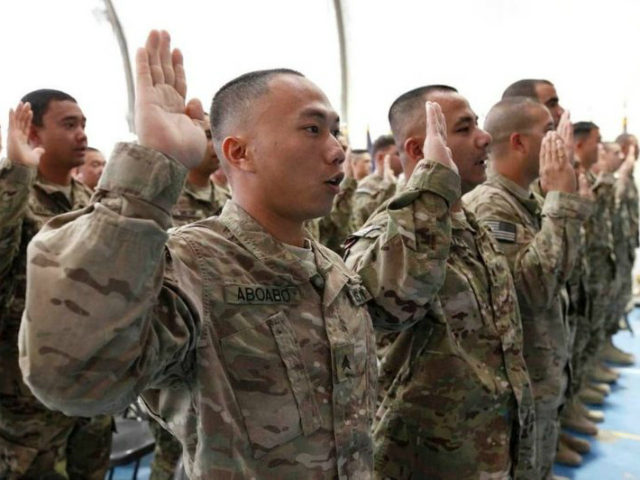The Pentagon is struggling to process a surge of immigrants who signed up to serve in the military and gain expedited U.S. citizenship under an Obama administration pilot program and may cancel the program altogether.
The program, called Military Accessions Vital to the National Interest (MAVNI), was created in 2009 to allow legal immigrants with critical language and medical skills to sign up for the military and gain U.S. citizenship.
In 2014, the Obama administration ordered the program to begin accepting recipients of Deferred Action for Childhood Arrivals (DACA), known as “Dreamers,” and more than tripled the numbers the program could accept–from 1,500 to more than 5,000 per year.
More than 10,400 immigrants signed up, including about 900 DACA recipients. The program soon ground to a halt, after the military had to retool the program to accept the new applicants and strengthen its vetting. The Pentagon suspended the program in September 2016, citing security concerns.
A backlog of about 4,000 are currently waiting to begin basic training, including about 360 recipients of the Deferred Action for Childhood Arrivals, according to Military.com.
News of a deal between President Trump and Democratic leaders provided some relief to the 360 or so DACA recipients who feared they would be deported before they began serving and became naturalized citizens.
Trump asked rhetorically on Twitter whether “anybody” would really want to throw out DACA recipients, including “some serving in the military”:
Does anybody really want to throw out good, educated and accomplished young people who have jobs, some serving in the military? Really!…..
— Donald J. Trump (@realDonaldTrump) September 14, 2017
But it is unclear whether any DACA recipients serving in the military would actually have been thrown out, since the estimated 500 who have gone through the MAVNI program to become naturalized U.S. citizens would not be thrown out.
Now, the matter is in the Pentagon’s hands — whether those who signed up will be allowed to serve or more will be accepted.
In May, Anthony Kurta, who was performing the duties of under secretary of defense for personnel and readiness, recommended to Defense Secretary Jim Mattis the cancellation of contracts for those who have not begun basic training and ending the program altogether due to an overtasked vetting process and heightened security risk, according to a Washington Post article in June.
It is not clear why Mattis has not made a decision yet or when he may do so. One reason could be that he is waiting for appointees handling personnel to be confirmed.
In July, Trump nominated Robert Wilkie as under secretary of defense for personnel and readiness, and Kurta as Wilkie’s principal deputy under secretary. They do not yet have confirmation hearings or votes scheduled in the Armed Services Committee.
The program has already faced multiple freezes, including one in 2010 and another in late 2014, after Obama ordered DACA recipients to be part of the program. In 2016, the Pentagon added new high-level counterintelligence screening requirements typically only required of high-level U.S. officials, according to an August Denver Post article.
The creator of the MAVNI program has blamed the program’s struggles on the Obama administration’s decision to admit DACA recipients into the program, which was meant to help the military in critical language skills, not serve as a way to allow DACAs to gain citizenship.
“They made a colossal error, frankly,” Margaret Stock, a retired Army lieutenant colonel and immigration lawyer, told Military.com.
“Instead of trying to recruit the DACAs separately, they tried to shove the DACAs into the MAVNI program. And that wrecked both programs.”

COMMENTS
Please let us know if you're having issues with commenting.